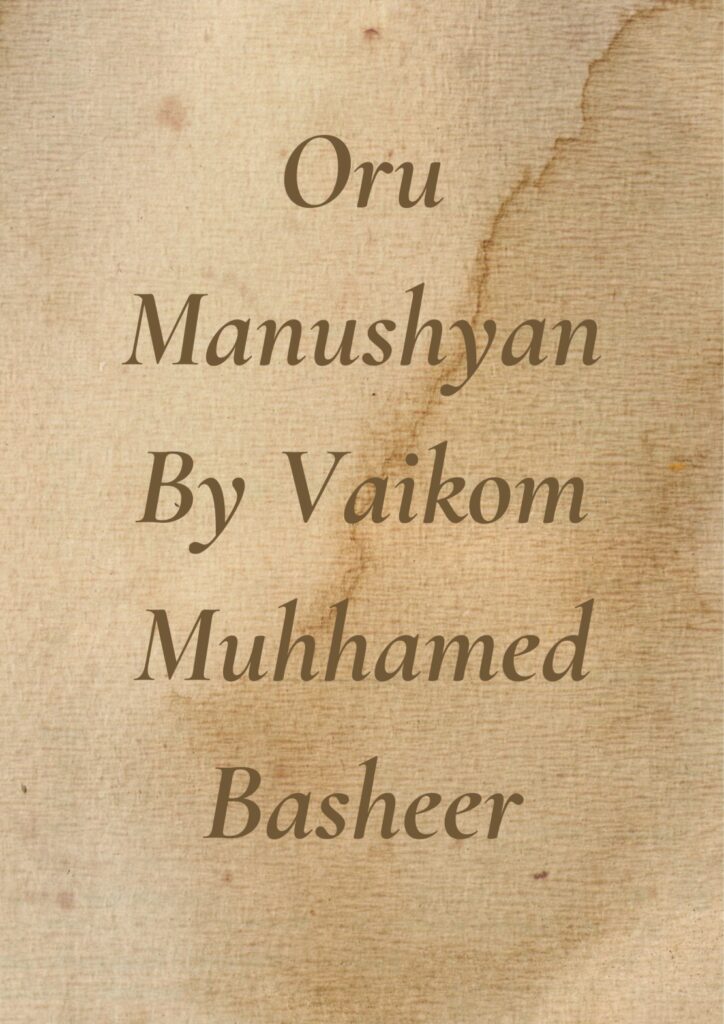Discover the powerful summary of Oru Manushyan by Vaikom Muhammad Basheer, a thought-provoking short story that explores human kindness, compassion, and the unexpected impact of a stranger’s help. Ideal for students and literature lovers.
Oru Manusyan 1st Puc Summary in English

BUY VAIKOM MUHAMMED BASHEER BOOKS ON AMAZON
Summary of Oru Manushyan in English By Vaikom Muhammed Basheer
“Oru Manushya,” which translates as “A Man,” is a short story by Indian writer Vaikom Muhammad Basheer. It was originally published in 1952.
The narrator is the main character in this story who remembers an incident from his life and narrates the experience of that incident. The narrator lived in a big city 1500 miles away from his hometown which was in a valley of mountains. People living in that city had no mercy in their hearts. They were very cruel people who could do anything for money. Murder, robbery, pick-pocketing happened there every day.
Further the narrator narrates that the inhabitants of that city used to work as soldiers, money lenders and watchmen in banks, mills and commercial establishments. From this we come to know what were the professions of the residents of that city.
The narrator used to live in a small dark room in that city which was on the dirty streets. The narrator used to teach English to migrant labourers. He used to do this work from 9:30 in the night till 11 o’clock. The narrator used to teach them to write addresses in English because in that city writing addresses in English was considered great education.
The narrator related to this story writes that for writing postal addresses, people were paid from Anna to Four Anna. Those days the narrator used to sleep the entire day and wake up at 4 in the evening, he did this so that he could save money from morning tea and lunch during the day. One day like every other day the narrator wakes up at 4 p.m. and goes to a restaurant to have tea and food, where it was very crowded. The narrator was wearing a coat that day, and in the coat pocket there was a wallet which contained fourteen rupees.
The narrator ate his fill and the bill came of 11 annas. The narrator puts his hand in his pocket to give the money, the narrator starts sweating and the food he ate must have been digested immediately. The reason was that the narrator did not find his wallet. He tells the restaurant owner that someone stole his wallet. The restaurant owner starts laughing loudly and feels that the narrator is lying. He tells the narrator that this trick will not work here, keep the money and go or else your eyes will be gouged out. The narrator knew that if the restaurant owner is saying this then he will definitely do this.
The narrator tells the restaurant owner to keep his coat in the restaurant and he would go out and get some money. But the restaurant owner does not trust the narrator and forces him to remove his coat, shirt and shoes. And finally the restaurant owner asks the narrator to take off his trousers, to which the narrator replies that there is nothing inside the trousers.
Everyone in the restaurant starts laughing at this. The narrator did not want to take off his trousers, he was hesitating a lot but no one in the restaurant believed him. The narrator had no other way, he had become very helpless, so he started opening the button of his trousers, then a voice comes, wait I will pay his bill. Everyone turns and looks at that man.
The narrator describes the physical appearance of that man. He writes that the man who saved him was a fair complexion man, six foot tall, with a red tourniquet and white trousers. He sported a handle-bar moustache and had blue eyes. That man paid 11 annas to the restaurant owner and asked the narrator to wear his clothes back. That man then asked the narrator to come with him, the narrator started going with that man, he thanked that man a lot.
The narrator said to that man that you have done a very good deed, I have never seen a person as good as you. That man started laughing at this, then that man asked the narrator his name, the narrator told him his name and where he came from. Then the narrator asked that man his name, the man said no name. Then they kept walking, while walking they came to a deserted bridge, that man started explaining to the narrator that look you will have to go from here without turning and if someone asks you whether you have seen me then don’t tell them.
Then that man took out five wallets from his pocket and asked the narrator which one of these is your wallet, the narrator pointed his hand towards the side of his wallet, then the man asked the narrator to open the wallet. When the narrator opened his wallet, he got back all his money with full respect, the narrator kept his wallet in his pocket. The narrator knew that the man had stolen his wallet because he was a pickpocket. The man said to the narrator, go, “My God help you.” The narrator also repeated the words and this is where the story ends.
Conclusion : –
The narrator has given some very sweet and good lessons through this story. Like every human being has some humanity in him and if a human being does not have even a little humanity then he cannot be a human being. In this story also, we saw that the man who saved the narrator was a thief but there was some humanity in him too because if this man had a heart of stone then he would not have saved the narrator.
Recommended Reading
Around A Medicinal Creeper By Poornachandra Tejaswi